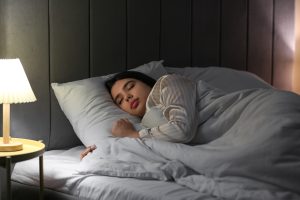Sleep Apnea Treatment vs. Snoring Treatment in Oswego, IL
Is Your Snoring an Indicator of Sleep Apnea?
Sleep is essential for our well-being, and disturbances during sleep can have a significant impact on our health and quality of life. Two common sleep-related issues that often get confused are sleep apnea and snoring. While both can disrupt a good night’s sleep, they’re distinct conditions with different causes, symptoms, and consequences. It is crucial to diagnose obstructive sleep apnea through a sleep study to monitor breathing patterns and identify the condition, especially given the potential health risks if left untreated.
At Downtown Dental & Implants of Oswego, our dental team is here to answer any questions you may have about your symptoms. Contact our Oswego dentist, Dr. Shalini Mohan D.M.D, today by calling (630) 554-1855 to schedule an appointment.
 What Is Snoring?
What Is Snoring?
Snoring is a common occurrence during sleep and is caused by the vibration of tissues in the throat as a person breathes. Snoring itself is not a sleep disorder but rather a symptom of airway obstruction or resistance to airflow during sleep.
The primary symptom of snoring is the sound produced during sleep. While many snorers don’t experience any significant issues related to their snoring, it can be disruptive to bed partners and occasionally indicate underlying sleep apnea. Our Oswego dental team is here to help you identify any sleeping issues you may be experiencing, as well as what could be causing them.
What Causes Snoring?
Snoring can be caused by various factors, including:
- Obesity
- Enlarged tonsils or adenoids
- Nasal congestion
- Sleeping position
- Alcohol and sedative use
- Age-related muscle relaxation
What Is Obstructive Sleep Apnea?
Sleep apnea is a sleep disorder characterized by repeated interruptions in breathing during sleep. These pauses in breathing, known as apneas, can last for seconds to minutes and can occur multiple times during the night.
There are two primary types of sleep apnea:
- Obstructive Sleep Apnea (OSA): This is the most common type of sleep apnea. Obstructive sleep apnea occurs when the muscles in the throat relax excessively during sleep, leading to the narrowing or complete closure of the airway.
- Central Sleep Apnea (CSA): CSA is less common and results from a failure of the brain to transmit the proper signals to the muscles responsible for controlling breathing.
Obstructive sleep apnea can be further classified based on severity. Mild obstructive sleep apnea is characterized by an apnea-hypopnea index (AHI) of 5 to 15 episodes per hour and often requires treatment options like CPAP and EPAP devices, especially for patients with comorbidities or cardiovascular risk factors. Moderate obstructive sleep apnea has an AHI between 15 and 30, and treatment options may include oral appliances and continuous positive airway pressure therapies. Severe sleep apnea involves an AHI of over 30 and may necessitate alternative therapies, such as specific oral appliances or surgical interventions, particularly for patients who cannot tolerate CPAP.
Sleep Apnea Symptoms
Common symptoms of sleep apnea include:
- Loud snoring
- Pauses in breathing during sleep
- Gasping or choking during sleep
- Excessive daytime sleepiness
- Morning headache
- Difficulty concentrating
- Irritability
Causes and Risk Factors of Sleep Apnea
Obstructive sleep apnea is a complex condition influenced by various factors. Understanding these causes and risk factors can help in both preventing and managing the disorder effectively.
Differences Between Snoring and Sleep Apnea
There are a few distinguishing factors between sleep apnea and snoring, including:
- Nature: Sleep apnea involves pauses in breathing during sleep, while snoring is the noisy vibration of tissues during breathing.
- Consequences: Sleep apnea can lead to serious health issues, including cardiovascular problems, whereas snoring is generally considered a nuisance.
- Diagnosis: Sleep apnea is diagnosed through sleep studies, while snoring is typically diagnosed based on the sound produced during sleep.
- Treatment: Treatment for sleep apnea may involve lifestyle changes, devices like CPAP machines, or surgery. Snoring management often includes lifestyle modifications and devices like snoring mouthpieces.
- Symptoms: Sleep apnea is associated with excessive daytime sleepiness, while snoring may not cause significant daytime symptoms.
Diagnosis and Treatment
Sleep Apnea and Continuous Positive Airway Pressure
- Diagnosis: Sleep apnea is typically diagnosed through a sleep study (polysomnography) that monitors various aspects of your sleep, including breathing patterns, oxygen levels, and brain activity. It is important to consult a sleep specialist for proper evaluation and treatment.
- Treatment: Treatment options to treat obstructive sleep apnea include lifestyle changes (weight loss, positional therapy), continuous positive airway pressure (CPAP) therapy, bilevel positive airway pressure (BPAP) for certain patients, oral appliances, surgery (for severe cases), and addressing underlying medical conditions.
Snoring
- Diagnosis: Snoring is often diagnosed based on a physical examination and a discussion of symptoms. In some cases, a sleep study may be recommended to rule out sleep apnea. A sleep study can also help identify other sleep disorders such as periodic limb movement disorder and narcolepsy.
- Treatment: Snoring can be managed through lifestyle changes (weight loss, avoiding alcohol and sedatives), positional therapy (changing sleep position), and using snoring mouthpieces or nasal strips.
Alternative Treatments for Sleep Apnea
While continuous positive airway pressure (CPAP) therapy is the gold standard for treating obstructive sleep apnea, it’s not the only option. For those who find CPAP uncomfortable or prefer other methods, several alternative treatments are available.
 Surgical Options for Sleep Apnea
Surgical Options for Sleep Apnea
For individuals with severe obstructive sleep apnea who do not respond to other treatments, surgery may be a viable option. Several surgical procedures can help widen the airway and improve breathing during sleep.
Frequently Asked Questions
Can snoring lead to sleep apnea?
While snoring itself is not a direct cause of sleep apnea, it can be a symptom or warning sign of sleep apnea. Snoring can sometimes be a sign of mild sleep apnea. Loud and persistent snoring should be evaluated by a healthcare professional.
Are there natural remedies for snoring?
Yes, there are natural remedies for snoring, such as weight loss, changing sleep position, and using saline nasal sprays to alleviate congestion. Lifestyle modifications can often reduce snoring.
Can children have sleep apnea?
Yes, children can have sleep apnea, which is often associated with enlarged tonsils or adenoids. Children can also have moderate sleep apnea, which requires proper diagnosis and treatment. It’s important to identify and treat pediatric sleep apnea to prevent long-term health issues.
Know When to Seek Treatment from a Sleep Specialist for Sleep Apnea
If you snore, it’s best to seek a sleep apnea evaluation. While snoring doesn’t always mean you have a sleep disorder, it’s always best to rule it out. To learn more from our Oswego dentist, contact us today by calling (630) 554-1855.
 What Is Snoring?
What Is Snoring? Surgical Options for Sleep Apnea
Surgical Options for Sleep Apnea